Contract Law: Analyzing Offer, Acceptance and the Carlill Case
VerifiedAdded on 2022/08/19
|12
|3286
|25
Report
AI Summary
This report provides a critical discussion of the case of Carlill v. Carbolic Smoke Ball Company, focusing on the principles of offer and acceptance in contract law. It begins with an introduction to contract law, defining its key elements and importance. The report then delves into the specifics of the Carlill case, explaining its facts, the court's decision, and its impact on contract law. The analysis includes discussions on the concept of offer, acceptance, consideration, and intention to create legal relations, as well as the distinction between an offer and an invitation to treat. It also explores the notions of unilateral and bilateral contracts. The report references relevant case law, including Storer v Manchester City Council, Harvey v Facey, and Fisher v Bell, and discusses the implications of the Uniform Commercial Code (UCC). The paper also includes a summary of the key legal concepts and provides a framework for understanding the formation of a contract and the remedies available in case of a breach. The report concludes by highlighting the lasting influence of the Carlill case on modern contract law. The assignment adheres to the specified word count and referencing guidelines, including OSCOLA Ireland referencing method, as required by Athlone Institute of Technology.
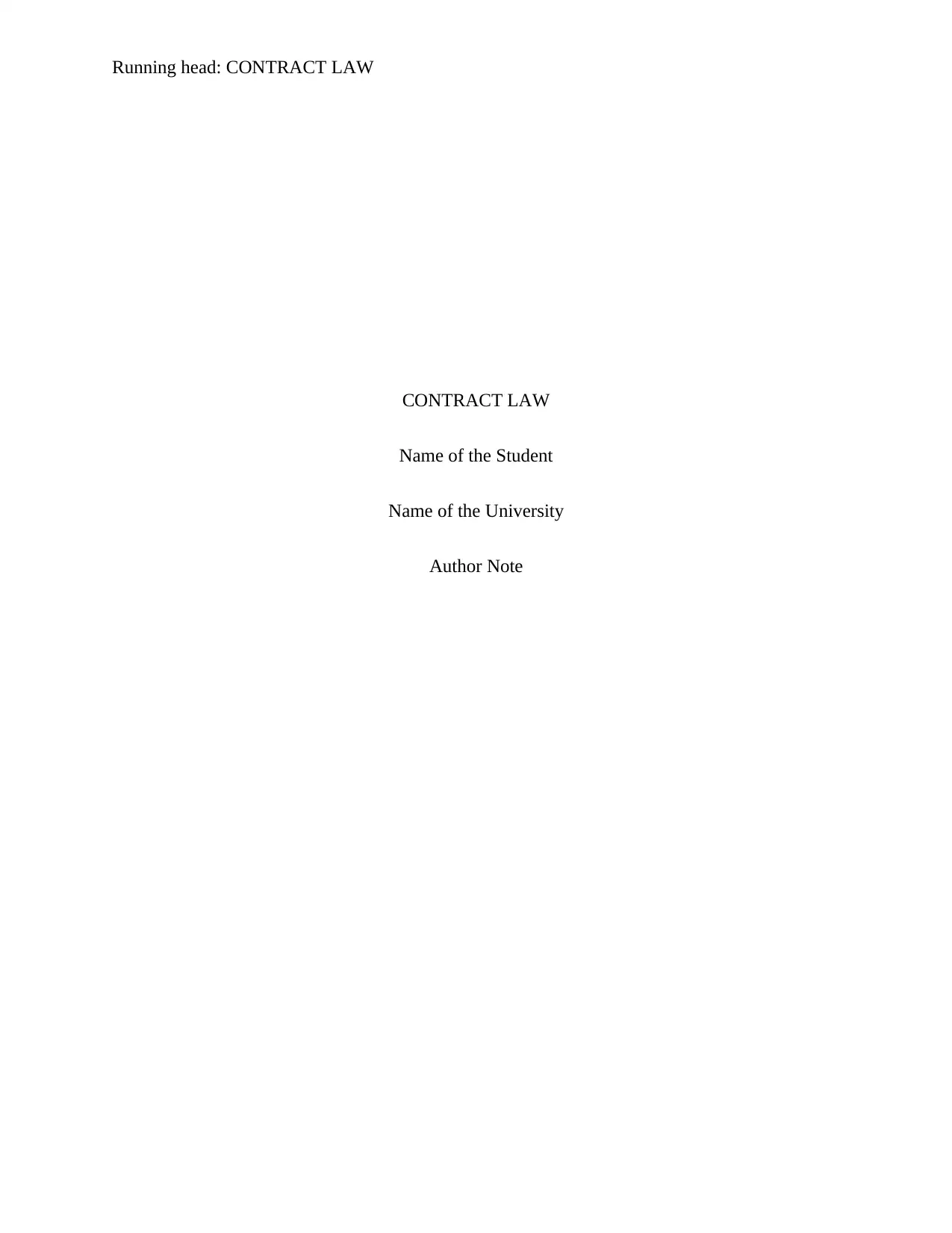
Running head: CONTRACT LAW
CONTRACT LAW
Name of the Student
Name of the University
Author Note
CONTRACT LAW
Name of the Student
Name of the University
Author Note
Paraphrase This Document
Need a fresh take? Get an instant paraphrase of this document with our AI Paraphraser
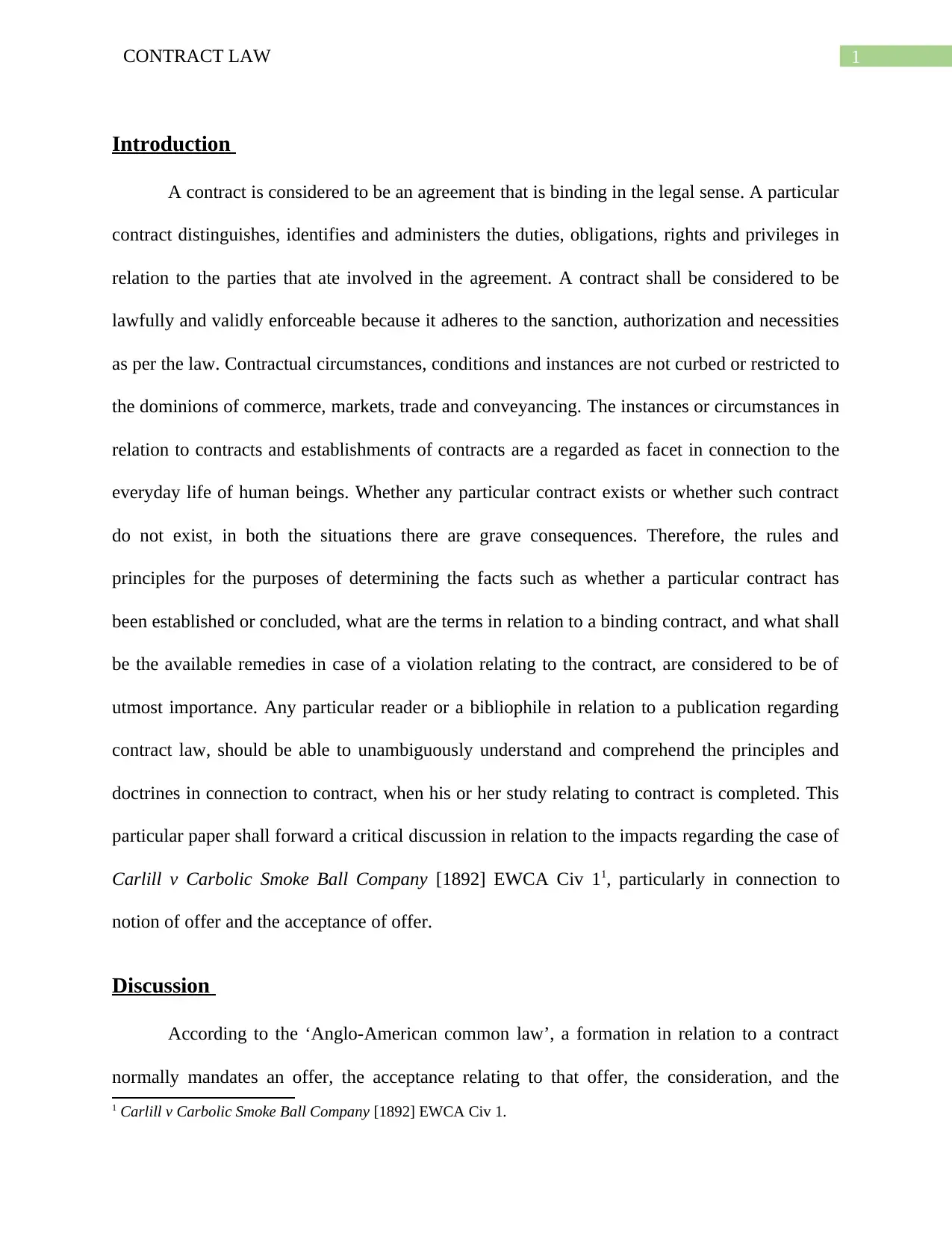
1CONTRACT LAW
Introduction
A contract is considered to be an agreement that is binding in the legal sense. A particular
contract distinguishes, identifies and administers the duties, obligations, rights and privileges in
relation to the parties that ate involved in the agreement. A contract shall be considered to be
lawfully and validly enforceable because it adheres to the sanction, authorization and necessities
as per the law. Contractual circumstances, conditions and instances are not curbed or restricted to
the dominions of commerce, markets, trade and conveyancing. The instances or circumstances in
relation to contracts and establishments of contracts are a regarded as facet in connection to the
everyday life of human beings. Whether any particular contract exists or whether such contract
do not exist, in both the situations there are grave consequences. Therefore, the rules and
principles for the purposes of determining the facts such as whether a particular contract has
been established or concluded, what are the terms in relation to a binding contract, and what shall
be the available remedies in case of a violation relating to the contract, are considered to be of
utmost importance. Any particular reader or a bibliophile in relation to a publication regarding
contract law, should be able to unambiguously understand and comprehend the principles and
doctrines in connection to contract, when his or her study relating to contract is completed. This
particular paper shall forward a critical discussion in relation to the impacts regarding the case of
Carlill v Carbolic Smoke Ball Company [1892] EWCA Civ 11, particularly in connection to
notion of offer and the acceptance of offer.
Discussion
According to the ‘Anglo-American common law’, a formation in relation to a contract
normally mandates an offer, the acceptance relating to that offer, the consideration, and the
1 Carlill v Carbolic Smoke Ball Company [1892] EWCA Civ 1.
Introduction
A contract is considered to be an agreement that is binding in the legal sense. A particular
contract distinguishes, identifies and administers the duties, obligations, rights and privileges in
relation to the parties that ate involved in the agreement. A contract shall be considered to be
lawfully and validly enforceable because it adheres to the sanction, authorization and necessities
as per the law. Contractual circumstances, conditions and instances are not curbed or restricted to
the dominions of commerce, markets, trade and conveyancing. The instances or circumstances in
relation to contracts and establishments of contracts are a regarded as facet in connection to the
everyday life of human beings. Whether any particular contract exists or whether such contract
do not exist, in both the situations there are grave consequences. Therefore, the rules and
principles for the purposes of determining the facts such as whether a particular contract has
been established or concluded, what are the terms in relation to a binding contract, and what shall
be the available remedies in case of a violation relating to the contract, are considered to be of
utmost importance. Any particular reader or a bibliophile in relation to a publication regarding
contract law, should be able to unambiguously understand and comprehend the principles and
doctrines in connection to contract, when his or her study relating to contract is completed. This
particular paper shall forward a critical discussion in relation to the impacts regarding the case of
Carlill v Carbolic Smoke Ball Company [1892] EWCA Civ 11, particularly in connection to
notion of offer and the acceptance of offer.
Discussion
According to the ‘Anglo-American common law’, a formation in relation to a contract
normally mandates an offer, the acceptance relating to that offer, the consideration, and the
1 Carlill v Carbolic Smoke Ball Company [1892] EWCA Civ 1.
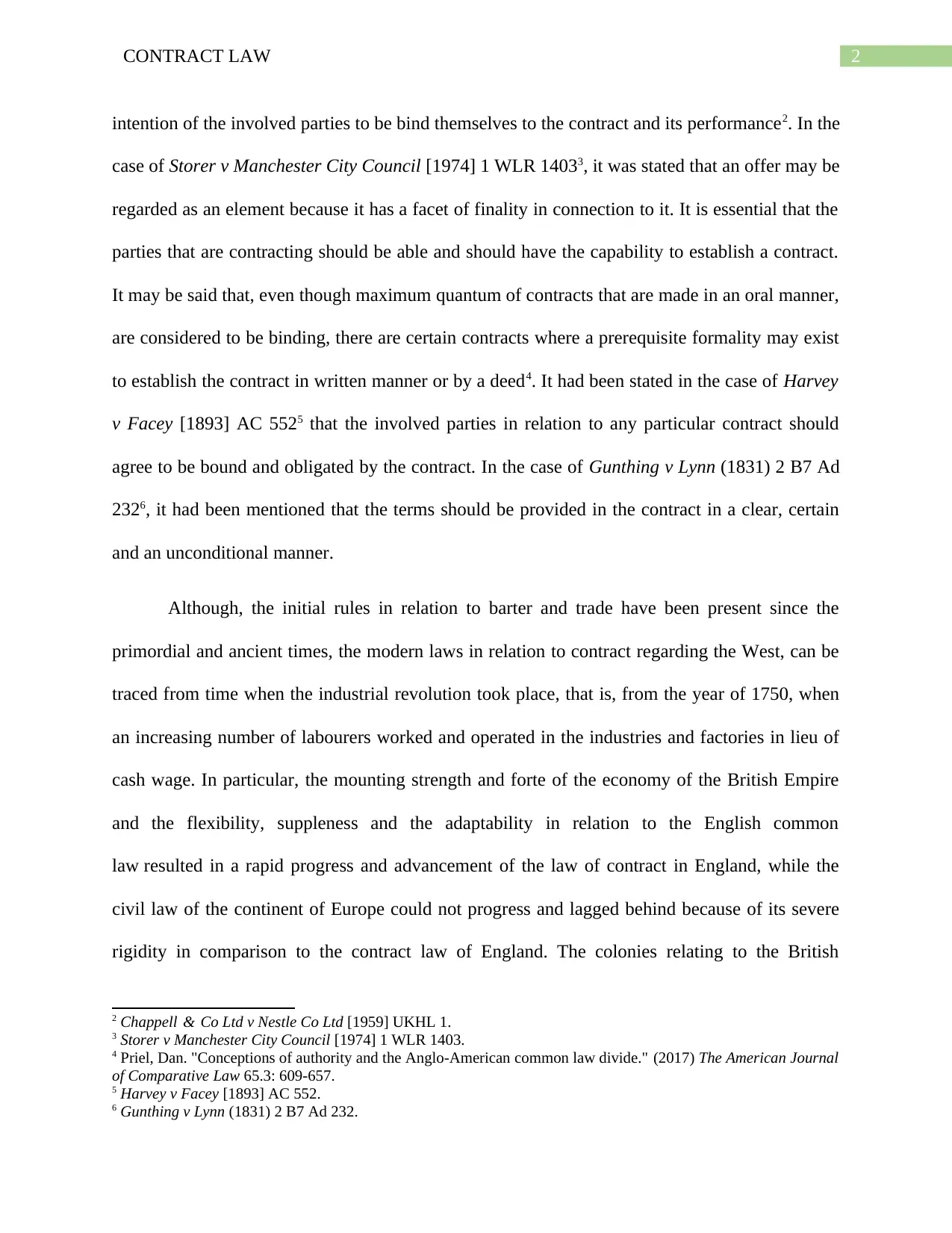
2CONTRACT LAW
intention of the involved parties to be bind themselves to the contract and its performance2. In the
case of Storer v Manchester City Council [1974] 1 WLR 14033, it was stated that an offer may be
regarded as an element because it has a facet of finality in connection to it. It is essential that the
parties that are contracting should be able and should have the capability to establish a contract.
It may be said that, even though maximum quantum of contracts that are made in an oral manner,
are considered to be binding, there are certain contracts where a prerequisite formality may exist
to establish the contract in written manner or by a deed4. It had been stated in the case of Harvey
v Facey [1893] AC 5525 that the involved parties in relation to any particular contract should
agree to be bound and obligated by the contract. In the case of Gunthing v Lynn (1831) 2 B7 Ad
2326, it had been mentioned that the terms should be provided in the contract in a clear, certain
and an unconditional manner.
Although, the initial rules in relation to barter and trade have been present since the
primordial and ancient times, the modern laws in relation to contract regarding the West, can be
traced from time when the industrial revolution took place, that is, from the year of 1750, when
an increasing number of labourers worked and operated in the industries and factories in lieu of
cash wage. In particular, the mounting strength and forte of the economy of the British Empire
and the flexibility, suppleness and the adaptability in relation to the English common
law resulted in a rapid progress and advancement of the law of contract in England, while the
civil law of the continent of Europe could not progress and lagged behind because of its severe
rigidity in comparison to the contract law of England. The colonies relating to the British
2 Chappell & Co Ltd v Nestle Co Ltd [1959] UKHL 1.
3 Storer v Manchester City Council [1974] 1 WLR 1403.
4 Priel, Dan. "Conceptions of authority and the Anglo-American common law divide." (2017) The American Journal
of Comparative Law 65.3: 609-657.
5 Harvey v Facey [1893] AC 552.
6 Gunthing v Lynn (1831) 2 B7 Ad 232.
intention of the involved parties to be bind themselves to the contract and its performance2. In the
case of Storer v Manchester City Council [1974] 1 WLR 14033, it was stated that an offer may be
regarded as an element because it has a facet of finality in connection to it. It is essential that the
parties that are contracting should be able and should have the capability to establish a contract.
It may be said that, even though maximum quantum of contracts that are made in an oral manner,
are considered to be binding, there are certain contracts where a prerequisite formality may exist
to establish the contract in written manner or by a deed4. It had been stated in the case of Harvey
v Facey [1893] AC 5525 that the involved parties in relation to any particular contract should
agree to be bound and obligated by the contract. In the case of Gunthing v Lynn (1831) 2 B7 Ad
2326, it had been mentioned that the terms should be provided in the contract in a clear, certain
and an unconditional manner.
Although, the initial rules in relation to barter and trade have been present since the
primordial and ancient times, the modern laws in relation to contract regarding the West, can be
traced from time when the industrial revolution took place, that is, from the year of 1750, when
an increasing number of labourers worked and operated in the industries and factories in lieu of
cash wage. In particular, the mounting strength and forte of the economy of the British Empire
and the flexibility, suppleness and the adaptability in relation to the English common
law resulted in a rapid progress and advancement of the law of contract in England, while the
civil law of the continent of Europe could not progress and lagged behind because of its severe
rigidity in comparison to the contract law of England. The colonies relating to the British
2 Chappell & Co Ltd v Nestle Co Ltd [1959] UKHL 1.
3 Storer v Manchester City Council [1974] 1 WLR 1403.
4 Priel, Dan. "Conceptions of authority and the Anglo-American common law divide." (2017) The American Journal
of Comparative Law 65.3: 609-657.
5 Harvey v Facey [1893] AC 552.
6 Gunthing v Lynn (1831) 2 B7 Ad 232.
⊘ This is a preview!⊘
Do you want full access?
Subscribe today to unlock all pages.

Trusted by 1+ million students worldwide
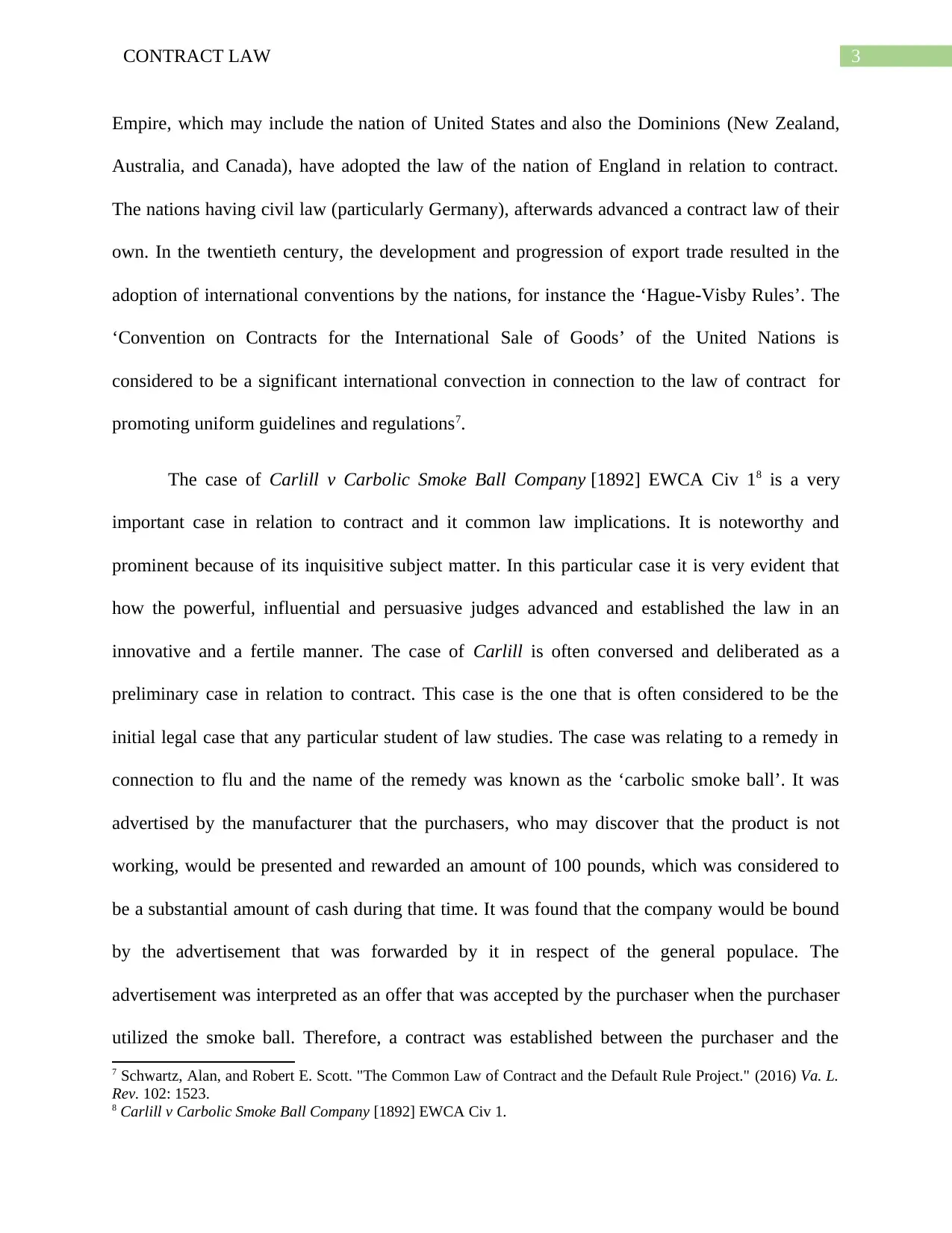
3CONTRACT LAW
Empire, which may include the nation of United States and also the Dominions (New Zealand,
Australia, and Canada), have adopted the law of the nation of England in relation to contract.
The nations having civil law (particularly Germany), afterwards advanced a contract law of their
own. In the twentieth century, the development and progression of export trade resulted in the
adoption of international conventions by the nations, for instance the ‘Hague-Visby Rules’. The
‘Convention on Contracts for the International Sale of Goods’ of the United Nations is
considered to be a significant international convection in connection to the law of contract for
promoting uniform guidelines and regulations7.
The case of Carlill v Carbolic Smoke Ball Company [1892] EWCA Civ 18 is a very
important case in relation to contract and it common law implications. It is noteworthy and
prominent because of its inquisitive subject matter. In this particular case it is very evident that
how the powerful, influential and persuasive judges advanced and established the law in an
innovative and a fertile manner. The case of Carlill is often conversed and deliberated as a
preliminary case in relation to contract. This case is the one that is often considered to be the
initial legal case that any particular student of law studies. The case was relating to a remedy in
connection to flu and the name of the remedy was known as the ‘carbolic smoke ball’. It was
advertised by the manufacturer that the purchasers, who may discover that the product is not
working, would be presented and rewarded an amount of 100 pounds, which was considered to
be a substantial amount of cash during that time. It was found that the company would be bound
by the advertisement that was forwarded by it in respect of the general populace. The
advertisement was interpreted as an offer that was accepted by the purchaser when the purchaser
utilized the smoke ball. Therefore, a contract was established between the purchaser and the
7 Schwartz, Alan, and Robert E. Scott. "The Common Law of Contract and the Default Rule Project." (2016) Va. L.
Rev. 102: 1523.
8 Carlill v Carbolic Smoke Ball Company [1892] EWCA Civ 1.
Empire, which may include the nation of United States and also the Dominions (New Zealand,
Australia, and Canada), have adopted the law of the nation of England in relation to contract.
The nations having civil law (particularly Germany), afterwards advanced a contract law of their
own. In the twentieth century, the development and progression of export trade resulted in the
adoption of international conventions by the nations, for instance the ‘Hague-Visby Rules’. The
‘Convention on Contracts for the International Sale of Goods’ of the United Nations is
considered to be a significant international convection in connection to the law of contract for
promoting uniform guidelines and regulations7.
The case of Carlill v Carbolic Smoke Ball Company [1892] EWCA Civ 18 is a very
important case in relation to contract and it common law implications. It is noteworthy and
prominent because of its inquisitive subject matter. In this particular case it is very evident that
how the powerful, influential and persuasive judges advanced and established the law in an
innovative and a fertile manner. The case of Carlill is often conversed and deliberated as a
preliminary case in relation to contract. This case is the one that is often considered to be the
initial legal case that any particular student of law studies. The case was relating to a remedy in
connection to flu and the name of the remedy was known as the ‘carbolic smoke ball’. It was
advertised by the manufacturer that the purchasers, who may discover that the product is not
working, would be presented and rewarded an amount of 100 pounds, which was considered to
be a substantial amount of cash during that time. It was found that the company would be bound
by the advertisement that was forwarded by it in respect of the general populace. The
advertisement was interpreted as an offer that was accepted by the purchaser when the purchaser
utilized the smoke ball. Therefore, a contract was established between the purchaser and the
7 Schwartz, Alan, and Robert E. Scott. "The Common Law of Contract and the Default Rule Project." (2016) Va. L.
Rev. 102: 1523.
8 Carlill v Carbolic Smoke Ball Company [1892] EWCA Civ 1.
Paraphrase This Document
Need a fresh take? Get an instant paraphrase of this document with our AI Paraphraser
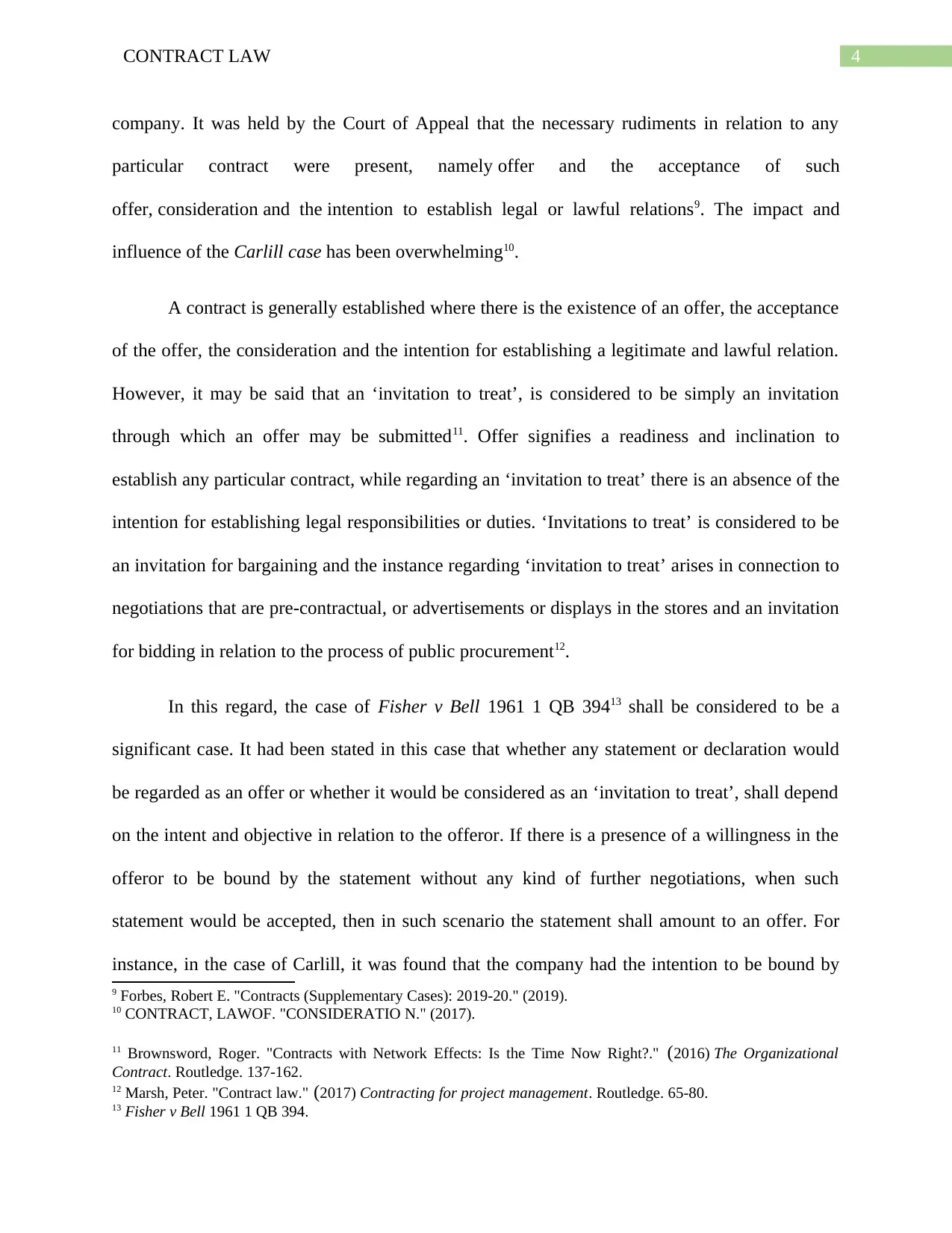
4CONTRACT LAW
company. It was held by the Court of Appeal that the necessary rudiments in relation to any
particular contract were present, namely offer and the acceptance of such
offer, consideration and the intention to establish legal or lawful relations9. The impact and
influence of the Carlill case has been overwhelming10.
A contract is generally established where there is the existence of an offer, the acceptance
of the offer, the consideration and the intention for establishing a legitimate and lawful relation.
However, it may be said that an ‘invitation to treat’, is considered to be simply an invitation
through which an offer may be submitted11. Offer signifies a readiness and inclination to
establish any particular contract, while regarding an ‘invitation to treat’ there is an absence of the
intention for establishing legal responsibilities or duties. ‘Invitations to treat’ is considered to be
an invitation for bargaining and the instance regarding ‘invitation to treat’ arises in connection to
negotiations that are pre-contractual, or advertisements or displays in the stores and an invitation
for bidding in relation to the process of public procurement12.
In this regard, the case of Fisher v Bell 1961 1 QB 39413 shall be considered to be a
significant case. It had been stated in this case that whether any statement or declaration would
be regarded as an offer or whether it would be considered as an ‘invitation to treat’, shall depend
on the intent and objective in relation to the offeror. If there is a presence of a willingness in the
offeror to be bound by the statement without any kind of further negotiations, when such
statement would be accepted, then in such scenario the statement shall amount to an offer. For
instance, in the case of Carlill, it was found that the company had the intention to be bound by
9 Forbes, Robert E. "Contracts (Supplementary Cases): 2019-20." (2019).
10 CONTRACT, LAWOF. "CONSIDERATIO N." (2017).
11 Brownsword, Roger. "Contracts with Network Effects: Is the Time Now Right?." (2016) The Organizational
Contract. Routledge. 137-162.
12 Marsh, Peter. "Contract law." (2017) Contracting for project management. Routledge. 65-80.
13 Fisher v Bell 1961 1 QB 394.
company. It was held by the Court of Appeal that the necessary rudiments in relation to any
particular contract were present, namely offer and the acceptance of such
offer, consideration and the intention to establish legal or lawful relations9. The impact and
influence of the Carlill case has been overwhelming10.
A contract is generally established where there is the existence of an offer, the acceptance
of the offer, the consideration and the intention for establishing a legitimate and lawful relation.
However, it may be said that an ‘invitation to treat’, is considered to be simply an invitation
through which an offer may be submitted11. Offer signifies a readiness and inclination to
establish any particular contract, while regarding an ‘invitation to treat’ there is an absence of the
intention for establishing legal responsibilities or duties. ‘Invitations to treat’ is considered to be
an invitation for bargaining and the instance regarding ‘invitation to treat’ arises in connection to
negotiations that are pre-contractual, or advertisements or displays in the stores and an invitation
for bidding in relation to the process of public procurement12.
In this regard, the case of Fisher v Bell 1961 1 QB 39413 shall be considered to be a
significant case. It had been stated in this case that whether any statement or declaration would
be regarded as an offer or whether it would be considered as an ‘invitation to treat’, shall depend
on the intent and objective in relation to the offeror. If there is a presence of a willingness in the
offeror to be bound by the statement without any kind of further negotiations, when such
statement would be accepted, then in such scenario the statement shall amount to an offer. For
instance, in the case of Carlill, it was found that the company had the intention to be bound by
9 Forbes, Robert E. "Contracts (Supplementary Cases): 2019-20." (2019).
10 CONTRACT, LAWOF. "CONSIDERATIO N." (2017).
11 Brownsword, Roger. "Contracts with Network Effects: Is the Time Now Right?." (2016) The Organizational
Contract. Routledge. 137-162.
12 Marsh, Peter. "Contract law." (2017) Contracting for project management. Routledge. 65-80.
13 Fisher v Bell 1961 1 QB 394.
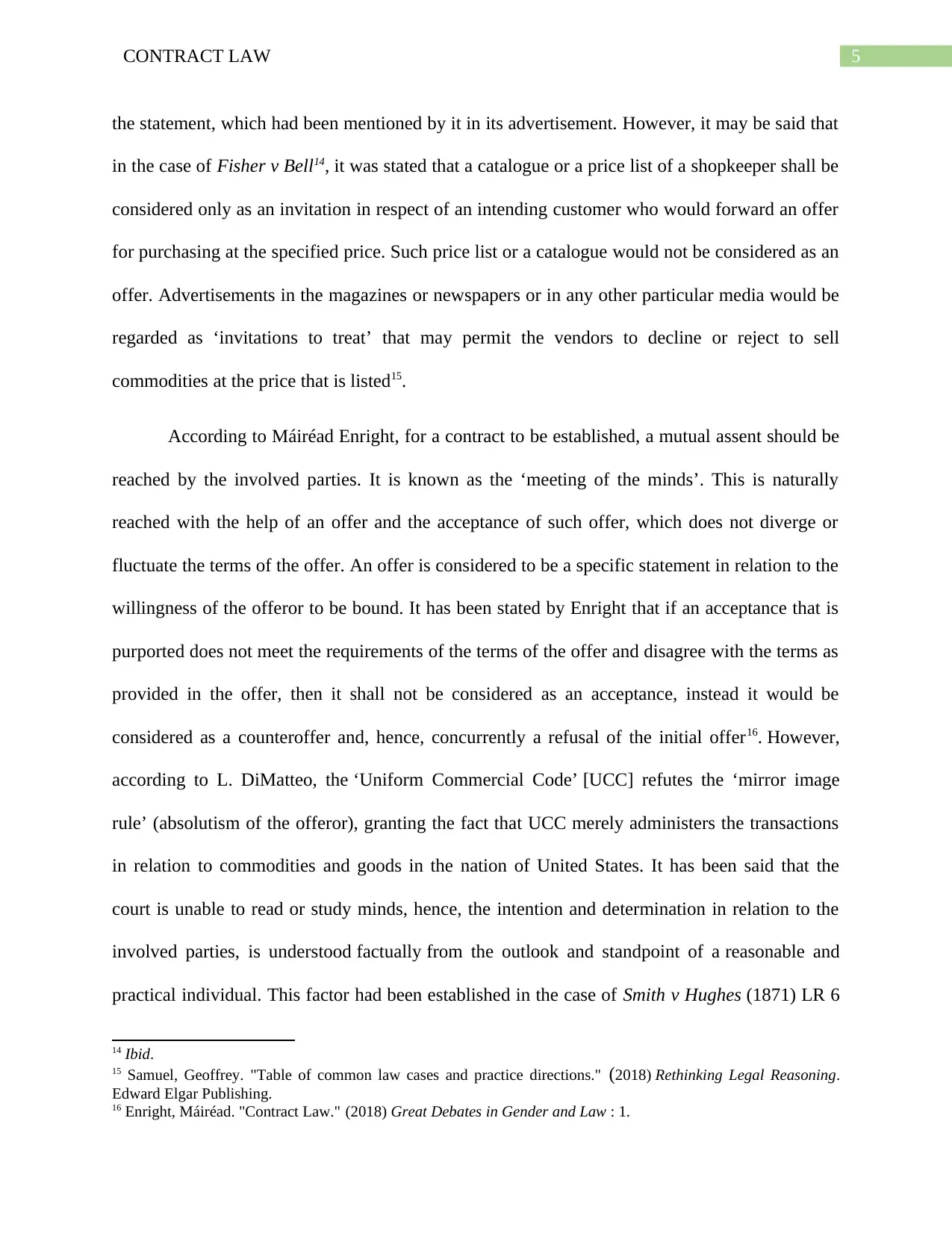
5CONTRACT LAW
the statement, which had been mentioned by it in its advertisement. However, it may be said that
in the case of Fisher v Bell14, it was stated that a catalogue or a price list of a shopkeeper shall be
considered only as an invitation in respect of an intending customer who would forward an offer
for purchasing at the specified price. Such price list or a catalogue would not be considered as an
offer. Advertisements in the magazines or newspapers or in any other particular media would be
regarded as ‘invitations to treat’ that may permit the vendors to decline or reject to sell
commodities at the price that is listed15.
According to Máiréad Enright, for a contract to be established, a mutual assent should be
reached by the involved parties. It is known as the ‘meeting of the minds’. This is naturally
reached with the help of an offer and the acceptance of such offer, which does not diverge or
fluctuate the terms of the offer. An offer is considered to be a specific statement in relation to the
willingness of the offeror to be bound. It has been stated by Enright that if an acceptance that is
purported does not meet the requirements of the terms of the offer and disagree with the terms as
provided in the offer, then it shall not be considered as an acceptance, instead it would be
considered as a counteroffer and, hence, concurrently a refusal of the initial offer16. However,
according to L. DiMatteo, the ‘Uniform Commercial Code’ [UCC] refutes the ‘mirror image
rule’ (absolutism of the offeror), granting the fact that UCC merely administers the transactions
in relation to commodities and goods in the nation of United States. It has been said that the
court is unable to read or study minds, hence, the intention and determination in relation to the
involved parties, is understood factually from the outlook and standpoint of a reasonable and
practical individual. This factor had been established in the case of Smith v Hughes (1871) LR 6
14 Ibid.
15 Samuel, Geoffrey. "Table of common law cases and practice directions." (2018) Rethinking Legal Reasoning.
Edward Elgar Publishing.
16 Enright, Máiréad. "Contract Law." (2018) Great Debates in Gender and Law : 1.
the statement, which had been mentioned by it in its advertisement. However, it may be said that
in the case of Fisher v Bell14, it was stated that a catalogue or a price list of a shopkeeper shall be
considered only as an invitation in respect of an intending customer who would forward an offer
for purchasing at the specified price. Such price list or a catalogue would not be considered as an
offer. Advertisements in the magazines or newspapers or in any other particular media would be
regarded as ‘invitations to treat’ that may permit the vendors to decline or reject to sell
commodities at the price that is listed15.
According to Máiréad Enright, for a contract to be established, a mutual assent should be
reached by the involved parties. It is known as the ‘meeting of the minds’. This is naturally
reached with the help of an offer and the acceptance of such offer, which does not diverge or
fluctuate the terms of the offer. An offer is considered to be a specific statement in relation to the
willingness of the offeror to be bound. It has been stated by Enright that if an acceptance that is
purported does not meet the requirements of the terms of the offer and disagree with the terms as
provided in the offer, then it shall not be considered as an acceptance, instead it would be
considered as a counteroffer and, hence, concurrently a refusal of the initial offer16. However,
according to L. DiMatteo, the ‘Uniform Commercial Code’ [UCC] refutes the ‘mirror image
rule’ (absolutism of the offeror), granting the fact that UCC merely administers the transactions
in relation to commodities and goods in the nation of United States. It has been said that the
court is unable to read or study minds, hence, the intention and determination in relation to the
involved parties, is understood factually from the outlook and standpoint of a reasonable and
practical individual. This factor had been established in the case of Smith v Hughes (1871) LR 6
14 Ibid.
15 Samuel, Geoffrey. "Table of common law cases and practice directions." (2018) Rethinking Legal Reasoning.
Edward Elgar Publishing.
16 Enright, Máiréad. "Contract Law." (2018) Great Debates in Gender and Law : 1.
⊘ This is a preview!⊘
Do you want full access?
Subscribe today to unlock all pages.

Trusted by 1+ million students worldwide
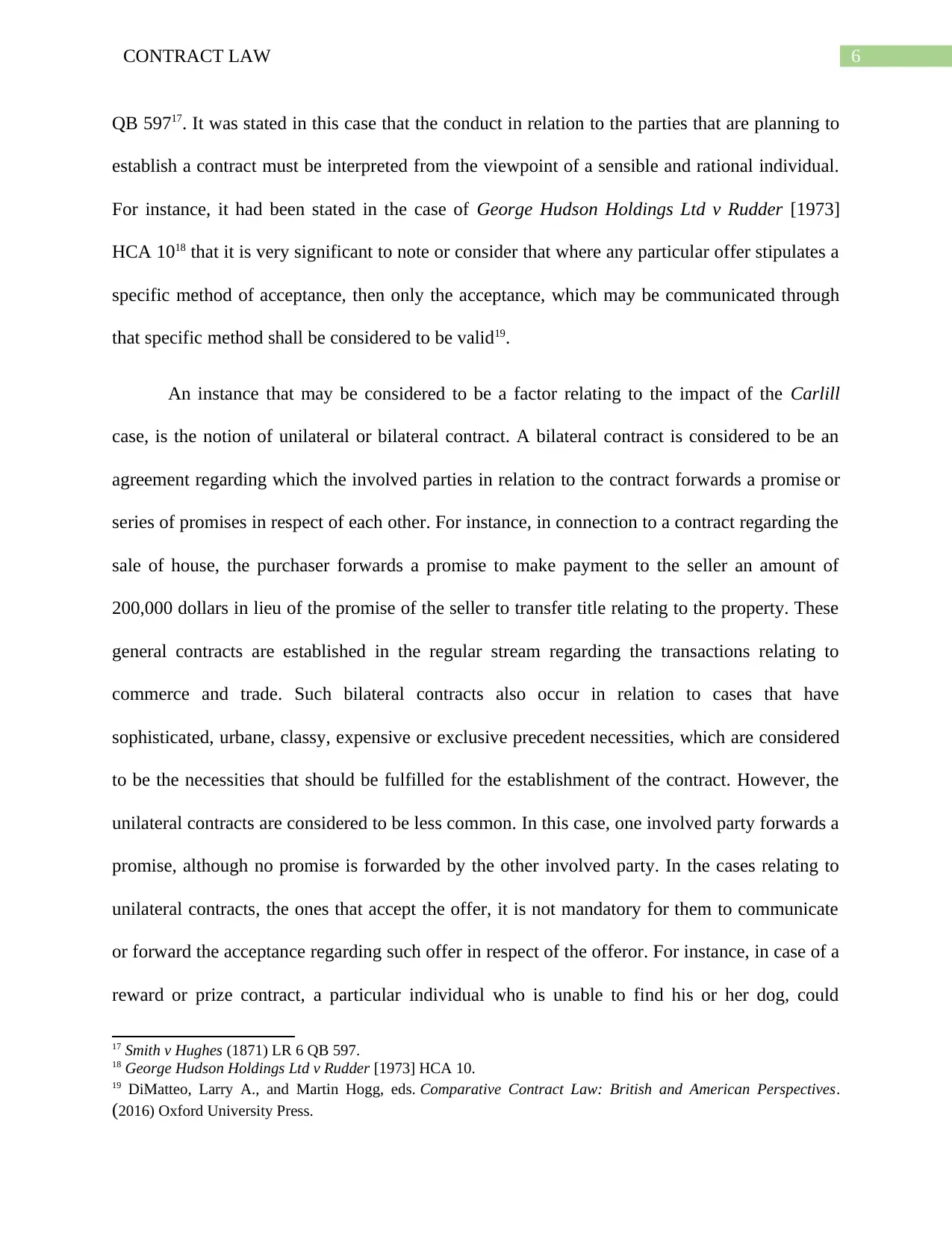
6CONTRACT LAW
QB 59717. It was stated in this case that the conduct in relation to the parties that are planning to
establish a contract must be interpreted from the viewpoint of a sensible and rational individual.
For instance, it had been stated in the case of George Hudson Holdings Ltd v Rudder [1973]
HCA 1018 that it is very significant to note or consider that where any particular offer stipulates a
specific method of acceptance, then only the acceptance, which may be communicated through
that specific method shall be considered to be valid19.
An instance that may be considered to be a factor relating to the impact of the Carlill
case, is the notion of unilateral or bilateral contract. A bilateral contract is considered to be an
agreement regarding which the involved parties in relation to the contract forwards a promise or
series of promises in respect of each other. For instance, in connection to a contract regarding the
sale of house, the purchaser forwards a promise to make payment to the seller an amount of
200,000 dollars in lieu of the promise of the seller to transfer title relating to the property. These
general contracts are established in the regular stream regarding the transactions relating to
commerce and trade. Such bilateral contracts also occur in relation to cases that have
sophisticated, urbane, classy, expensive or exclusive precedent necessities, which are considered
to be the necessities that should be fulfilled for the establishment of the contract. However, the
unilateral contracts are considered to be less common. In this case, one involved party forwards a
promise, although no promise is forwarded by the other involved party. In the cases relating to
unilateral contracts, the ones that accept the offer, it is not mandatory for them to communicate
or forward the acceptance regarding such offer in respect of the offeror. For instance, in case of a
reward or prize contract, a particular individual who is unable to find his or her dog, could
17 Smith v Hughes (1871) LR 6 QB 597.
18 George Hudson Holdings Ltd v Rudder [1973] HCA 10.
19 DiMatteo, Larry A., and Martin Hogg, eds. Comparative Contract Law: British and American Perspectives.
(2016) Oxford University Press.
QB 59717. It was stated in this case that the conduct in relation to the parties that are planning to
establish a contract must be interpreted from the viewpoint of a sensible and rational individual.
For instance, it had been stated in the case of George Hudson Holdings Ltd v Rudder [1973]
HCA 1018 that it is very significant to note or consider that where any particular offer stipulates a
specific method of acceptance, then only the acceptance, which may be communicated through
that specific method shall be considered to be valid19.
An instance that may be considered to be a factor relating to the impact of the Carlill
case, is the notion of unilateral or bilateral contract. A bilateral contract is considered to be an
agreement regarding which the involved parties in relation to the contract forwards a promise or
series of promises in respect of each other. For instance, in connection to a contract regarding the
sale of house, the purchaser forwards a promise to make payment to the seller an amount of
200,000 dollars in lieu of the promise of the seller to transfer title relating to the property. These
general contracts are established in the regular stream regarding the transactions relating to
commerce and trade. Such bilateral contracts also occur in relation to cases that have
sophisticated, urbane, classy, expensive or exclusive precedent necessities, which are considered
to be the necessities that should be fulfilled for the establishment of the contract. However, the
unilateral contracts are considered to be less common. In this case, one involved party forwards a
promise, although no promise is forwarded by the other involved party. In the cases relating to
unilateral contracts, the ones that accept the offer, it is not mandatory for them to communicate
or forward the acceptance regarding such offer in respect of the offeror. For instance, in case of a
reward or prize contract, a particular individual who is unable to find his or her dog, could
17 Smith v Hughes (1871) LR 6 QB 597.
18 George Hudson Holdings Ltd v Rudder [1973] HCA 10.
19 DiMatteo, Larry A., and Martin Hogg, eds. Comparative Contract Law: British and American Perspectives.
(2016) Oxford University Press.
Paraphrase This Document
Need a fresh take? Get an instant paraphrase of this document with our AI Paraphraser
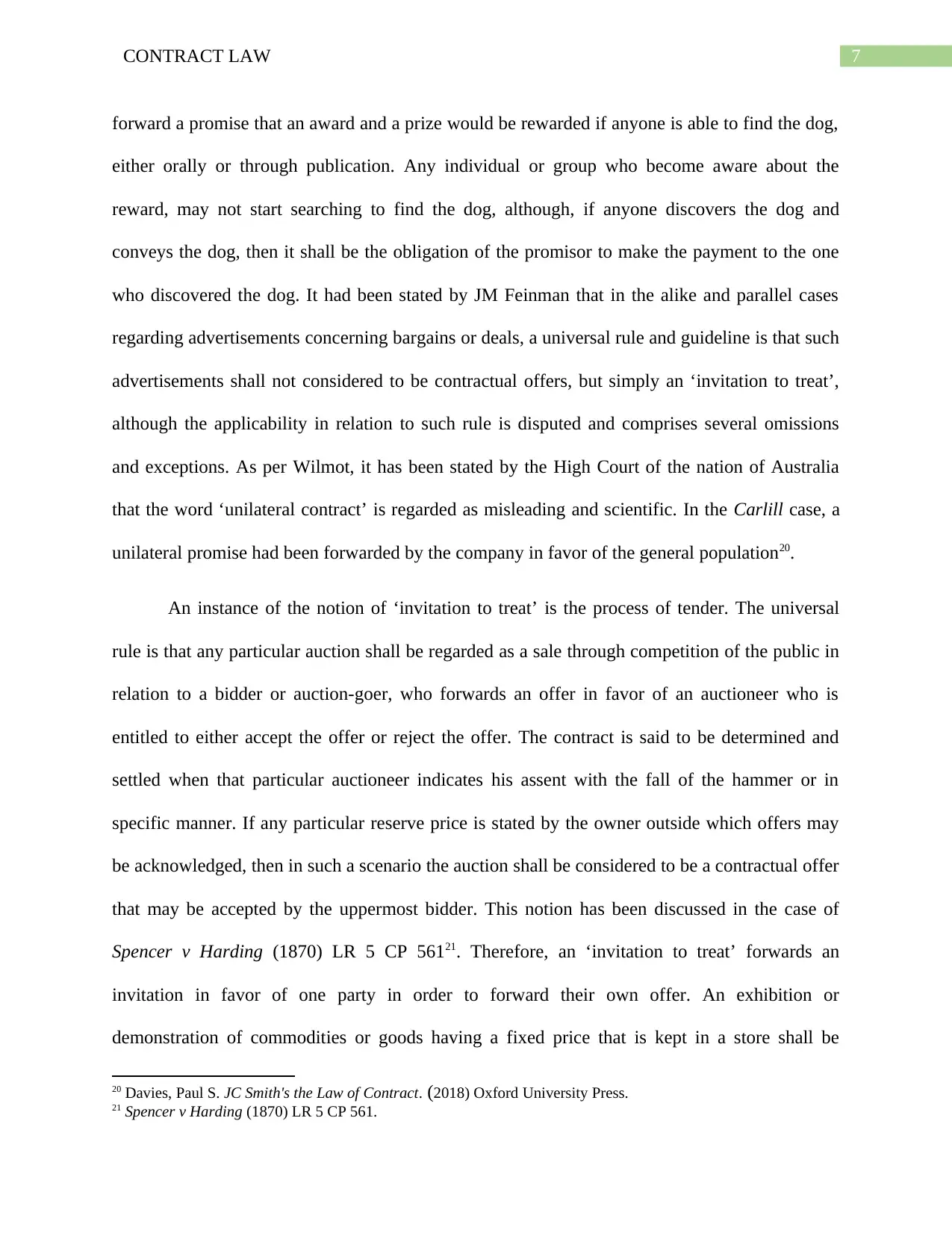
7CONTRACT LAW
forward a promise that an award and a prize would be rewarded if anyone is able to find the dog,
either orally or through publication. Any individual or group who become aware about the
reward, may not start searching to find the dog, although, if anyone discovers the dog and
conveys the dog, then it shall be the obligation of the promisor to make the payment to the one
who discovered the dog. It had been stated by JM Feinman that in the alike and parallel cases
regarding advertisements concerning bargains or deals, a universal rule and guideline is that such
advertisements shall not considered to be contractual offers, but simply an ‘invitation to treat’,
although the applicability in relation to such rule is disputed and comprises several omissions
and exceptions. As per Wilmot, it has been stated by the High Court of the nation of Australia
that the word ‘unilateral contract’ is regarded as misleading and scientific. In the Carlill case, a
unilateral promise had been forwarded by the company in favor of the general population20.
An instance of the notion of ‘invitation to treat’ is the process of tender. The universal
rule is that any particular auction shall be regarded as a sale through competition of the public in
relation to a bidder or auction-goer, who forwards an offer in favor of an auctioneer who is
entitled to either accept the offer or reject the offer. The contract is said to be determined and
settled when that particular auctioneer indicates his assent with the fall of the hammer or in
specific manner. If any particular reserve price is stated by the owner outside which offers may
be acknowledged, then in such a scenario the auction shall be considered to be a contractual offer
that may be accepted by the uppermost bidder. This notion has been discussed in the case of
Spencer v Harding (1870) LR 5 CP 56121. Therefore, an ‘invitation to treat’ forwards an
invitation in favor of one party in order to forward their own offer. An exhibition or
demonstration of commodities or goods having a fixed price that is kept in a store shall be
20 Davies, Paul S. JC Smith's the Law of Contract. (2018) Oxford University Press.
21 Spencer v Harding (1870) LR 5 CP 561.
forward a promise that an award and a prize would be rewarded if anyone is able to find the dog,
either orally or through publication. Any individual or group who become aware about the
reward, may not start searching to find the dog, although, if anyone discovers the dog and
conveys the dog, then it shall be the obligation of the promisor to make the payment to the one
who discovered the dog. It had been stated by JM Feinman that in the alike and parallel cases
regarding advertisements concerning bargains or deals, a universal rule and guideline is that such
advertisements shall not considered to be contractual offers, but simply an ‘invitation to treat’,
although the applicability in relation to such rule is disputed and comprises several omissions
and exceptions. As per Wilmot, it has been stated by the High Court of the nation of Australia
that the word ‘unilateral contract’ is regarded as misleading and scientific. In the Carlill case, a
unilateral promise had been forwarded by the company in favor of the general population20.
An instance of the notion of ‘invitation to treat’ is the process of tender. The universal
rule is that any particular auction shall be regarded as a sale through competition of the public in
relation to a bidder or auction-goer, who forwards an offer in favor of an auctioneer who is
entitled to either accept the offer or reject the offer. The contract is said to be determined and
settled when that particular auctioneer indicates his assent with the fall of the hammer or in
specific manner. If any particular reserve price is stated by the owner outside which offers may
be acknowledged, then in such a scenario the auction shall be considered to be a contractual offer
that may be accepted by the uppermost bidder. This notion has been discussed in the case of
Spencer v Harding (1870) LR 5 CP 56121. Therefore, an ‘invitation to treat’ forwards an
invitation in favor of one party in order to forward their own offer. An exhibition or
demonstration of commodities or goods having a fixed price that is kept in a store shall be
20 Davies, Paul S. JC Smith's the Law of Contract. (2018) Oxford University Press.
21 Spencer v Harding (1870) LR 5 CP 561.
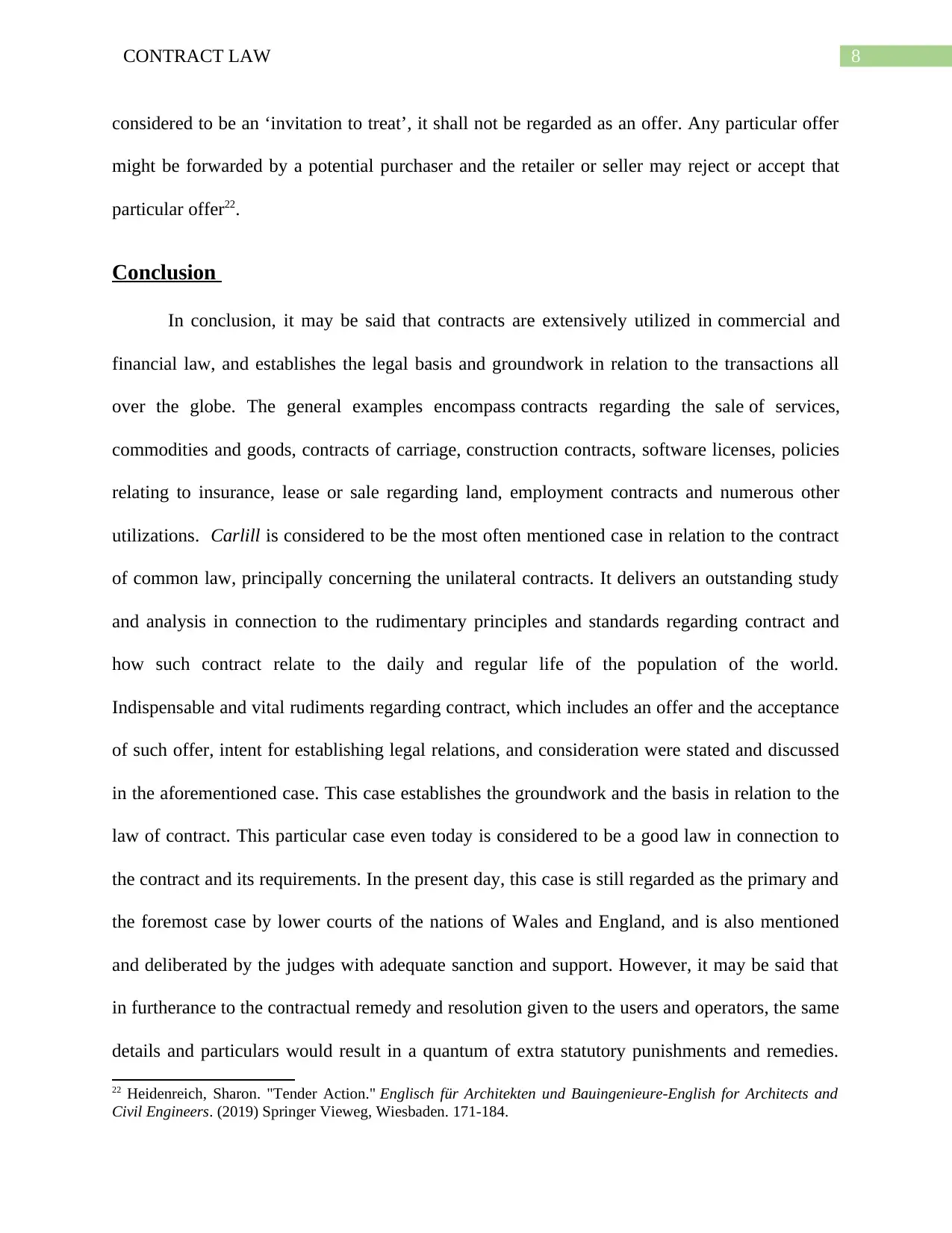
8CONTRACT LAW
considered to be an ‘invitation to treat’, it shall not be regarded as an offer. Any particular offer
might be forwarded by a potential purchaser and the retailer or seller may reject or accept that
particular offer22.
Conclusion
In conclusion, it may be said that contracts are extensively utilized in commercial and
financial law, and establishes the legal basis and groundwork in relation to the transactions all
over the globe. The general examples encompass contracts regarding the sale of services,
commodities and goods, contracts of carriage, construction contracts, software licenses, policies
relating to insurance, lease or sale regarding land, employment contracts and numerous other
utilizations. Carlill is considered to be the most often mentioned case in relation to the contract
of common law, principally concerning the unilateral contracts. It delivers an outstanding study
and analysis in connection to the rudimentary principles and standards regarding contract and
how such contract relate to the daily and regular life of the population of the world.
Indispensable and vital rudiments regarding contract, which includes an offer and the acceptance
of such offer, intent for establishing legal relations, and consideration were stated and discussed
in the aforementioned case. This case establishes the groundwork and the basis in relation to the
law of contract. This particular case even today is considered to be a good law in connection to
the contract and its requirements. In the present day, this case is still regarded as the primary and
the foremost case by lower courts of the nations of Wales and England, and is also mentioned
and deliberated by the judges with adequate sanction and support. However, it may be said that
in furtherance to the contractual remedy and resolution given to the users and operators, the same
details and particulars would result in a quantum of extra statutory punishments and remedies.
22 Heidenreich, Sharon. "Tender Action." Englisch für Architekten und Bauingenieure-English for Architects and
Civil Engineers. (2019) Springer Vieweg, Wiesbaden. 171-184.
considered to be an ‘invitation to treat’, it shall not be regarded as an offer. Any particular offer
might be forwarded by a potential purchaser and the retailer or seller may reject or accept that
particular offer22.
Conclusion
In conclusion, it may be said that contracts are extensively utilized in commercial and
financial law, and establishes the legal basis and groundwork in relation to the transactions all
over the globe. The general examples encompass contracts regarding the sale of services,
commodities and goods, contracts of carriage, construction contracts, software licenses, policies
relating to insurance, lease or sale regarding land, employment contracts and numerous other
utilizations. Carlill is considered to be the most often mentioned case in relation to the contract
of common law, principally concerning the unilateral contracts. It delivers an outstanding study
and analysis in connection to the rudimentary principles and standards regarding contract and
how such contract relate to the daily and regular life of the population of the world.
Indispensable and vital rudiments regarding contract, which includes an offer and the acceptance
of such offer, intent for establishing legal relations, and consideration were stated and discussed
in the aforementioned case. This case establishes the groundwork and the basis in relation to the
law of contract. This particular case even today is considered to be a good law in connection to
the contract and its requirements. In the present day, this case is still regarded as the primary and
the foremost case by lower courts of the nations of Wales and England, and is also mentioned
and deliberated by the judges with adequate sanction and support. However, it may be said that
in furtherance to the contractual remedy and resolution given to the users and operators, the same
details and particulars would result in a quantum of extra statutory punishments and remedies.
22 Heidenreich, Sharon. "Tender Action." Englisch für Architekten und Bauingenieure-English for Architects and
Civil Engineers. (2019) Springer Vieweg, Wiesbaden. 171-184.
⊘ This is a preview!⊘
Do you want full access?
Subscribe today to unlock all pages.

Trusted by 1+ million students worldwide
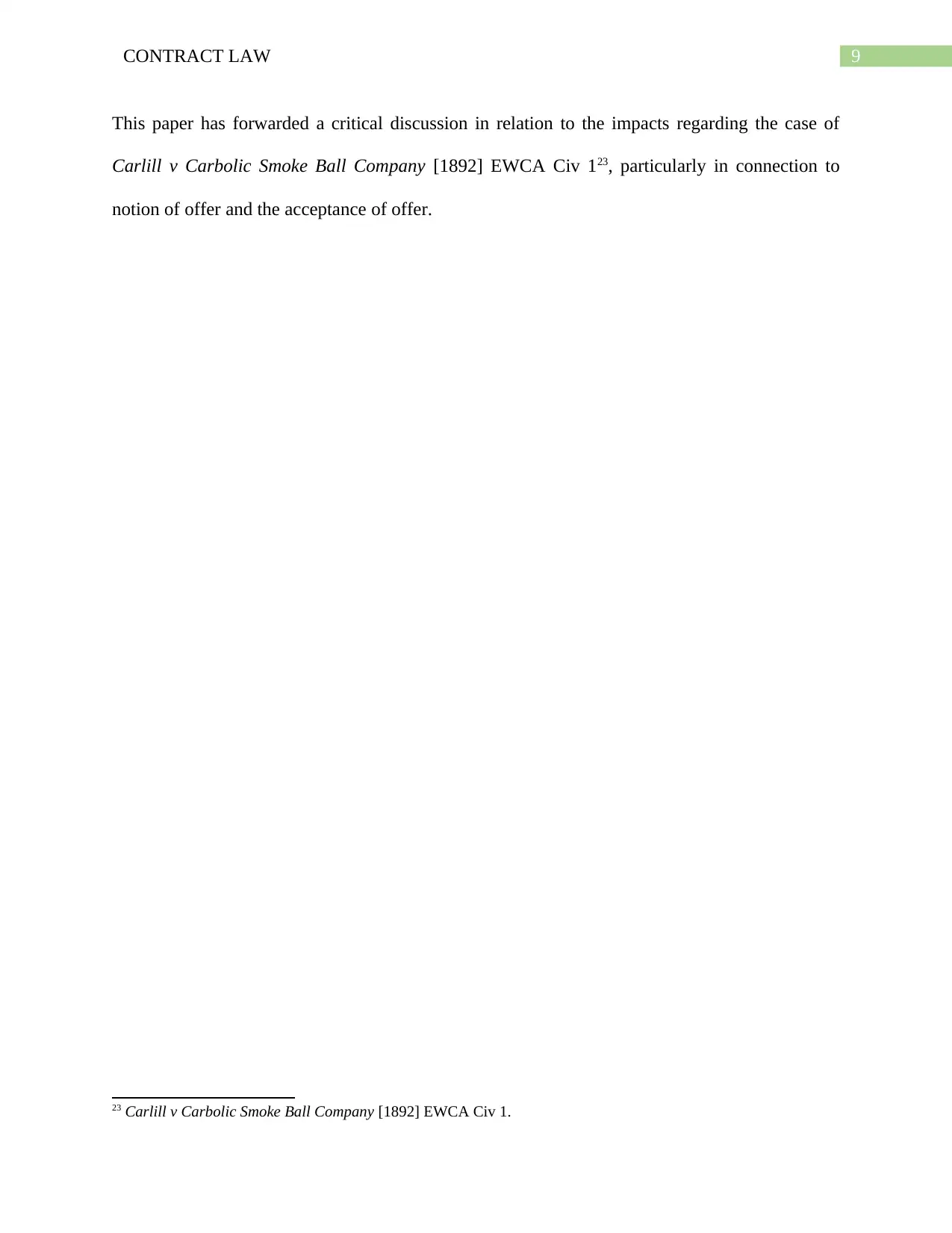
9CONTRACT LAW
This paper has forwarded a critical discussion in relation to the impacts regarding the case of
Carlill v Carbolic Smoke Ball Company [1892] EWCA Civ 123, particularly in connection to
notion of offer and the acceptance of offer.
23 Carlill v Carbolic Smoke Ball Company [1892] EWCA Civ 1.
This paper has forwarded a critical discussion in relation to the impacts regarding the case of
Carlill v Carbolic Smoke Ball Company [1892] EWCA Civ 123, particularly in connection to
notion of offer and the acceptance of offer.
23 Carlill v Carbolic Smoke Ball Company [1892] EWCA Civ 1.
Paraphrase This Document
Need a fresh take? Get an instant paraphrase of this document with our AI Paraphraser
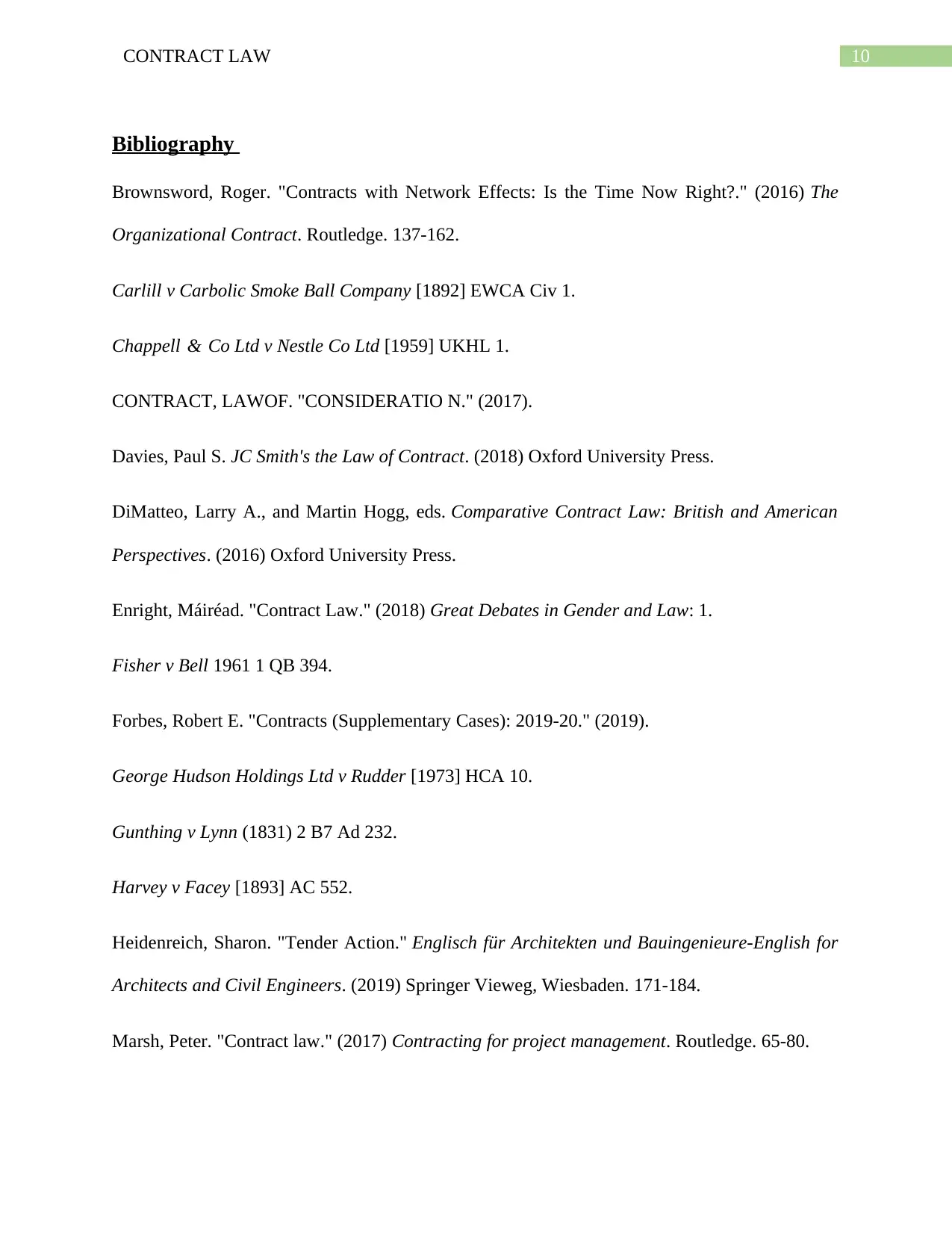
10CONTRACT LAW
Bibliography
Brownsword, Roger. "Contracts with Network Effects: Is the Time Now Right?." (2016) The
Organizational Contract. Routledge. 137-162.
Carlill v Carbolic Smoke Ball Company [1892] EWCA Civ 1.
Chappell & Co Ltd v Nestle Co Ltd [1959] UKHL 1.
CONTRACT, LAWOF. "CONSIDERATIO N." (2017).
Davies, Paul S. JC Smith's the Law of Contract. (2018) Oxford University Press.
DiMatteo, Larry A., and Martin Hogg, eds. Comparative Contract Law: British and American
Perspectives. (2016) Oxford University Press.
Enright, Máiréad. "Contract Law." (2018) Great Debates in Gender and Law: 1.
Fisher v Bell 1961 1 QB 394.
Forbes, Robert E. "Contracts (Supplementary Cases): 2019-20." (2019).
George Hudson Holdings Ltd v Rudder [1973] HCA 10.
Gunthing v Lynn (1831) 2 B7 Ad 232.
Harvey v Facey [1893] AC 552.
Heidenreich, Sharon. "Tender Action." Englisch für Architekten und Bauingenieure-English for
Architects and Civil Engineers. (2019) Springer Vieweg, Wiesbaden. 171-184.
Marsh, Peter. "Contract law." (2017) Contracting for project management. Routledge. 65-80.
Bibliography
Brownsword, Roger. "Contracts with Network Effects: Is the Time Now Right?." (2016) The
Organizational Contract. Routledge. 137-162.
Carlill v Carbolic Smoke Ball Company [1892] EWCA Civ 1.
Chappell & Co Ltd v Nestle Co Ltd [1959] UKHL 1.
CONTRACT, LAWOF. "CONSIDERATIO N." (2017).
Davies, Paul S. JC Smith's the Law of Contract. (2018) Oxford University Press.
DiMatteo, Larry A., and Martin Hogg, eds. Comparative Contract Law: British and American
Perspectives. (2016) Oxford University Press.
Enright, Máiréad. "Contract Law." (2018) Great Debates in Gender and Law: 1.
Fisher v Bell 1961 1 QB 394.
Forbes, Robert E. "Contracts (Supplementary Cases): 2019-20." (2019).
George Hudson Holdings Ltd v Rudder [1973] HCA 10.
Gunthing v Lynn (1831) 2 B7 Ad 232.
Harvey v Facey [1893] AC 552.
Heidenreich, Sharon. "Tender Action." Englisch für Architekten und Bauingenieure-English for
Architects and Civil Engineers. (2019) Springer Vieweg, Wiesbaden. 171-184.
Marsh, Peter. "Contract law." (2017) Contracting for project management. Routledge. 65-80.
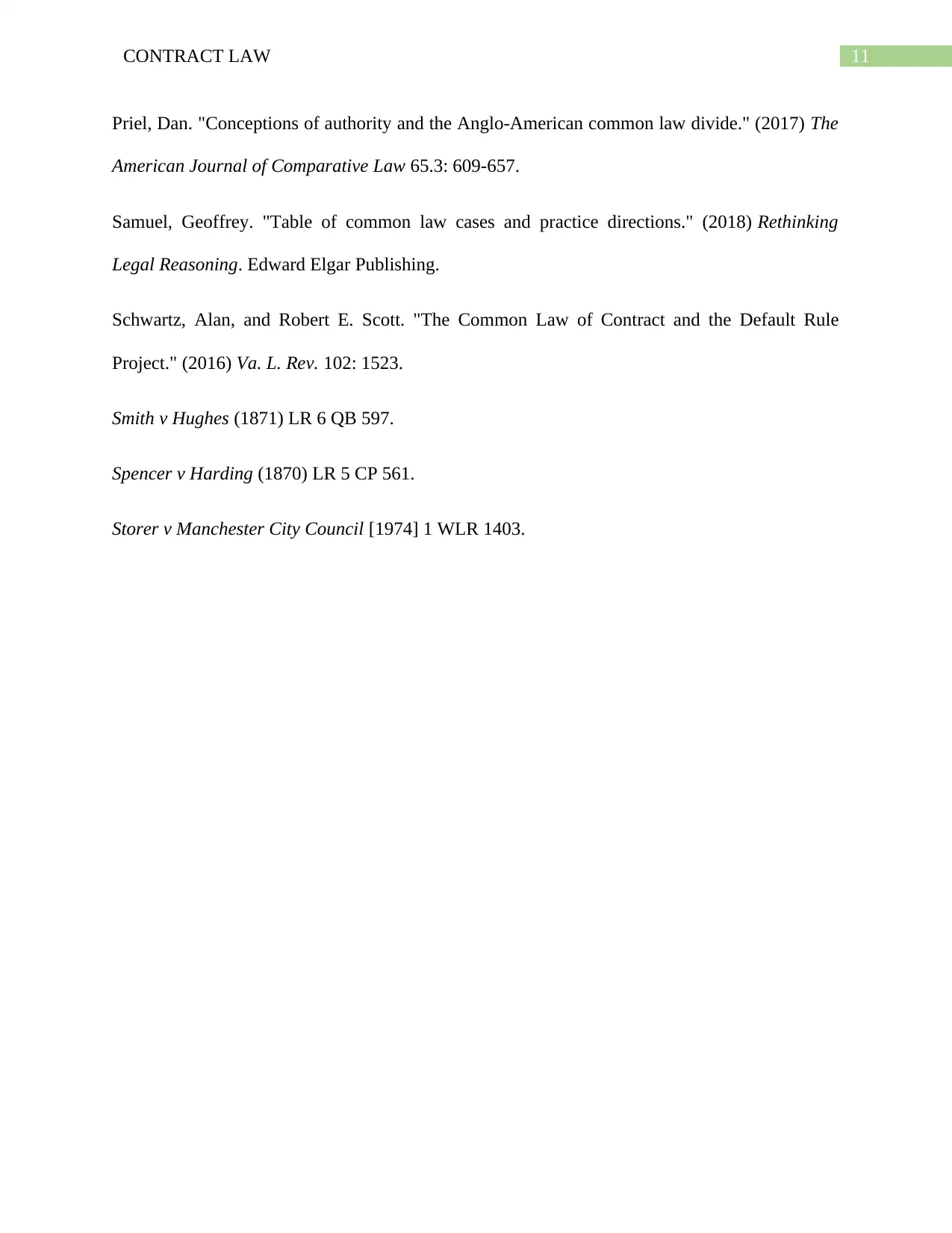
11CONTRACT LAW
Priel, Dan. "Conceptions of authority and the Anglo-American common law divide." (2017) The
American Journal of Comparative Law 65.3: 609-657.
Samuel, Geoffrey. "Table of common law cases and practice directions." (2018) Rethinking
Legal Reasoning. Edward Elgar Publishing.
Schwartz, Alan, and Robert E. Scott. "The Common Law of Contract and the Default Rule
Project." (2016) Va. L. Rev. 102: 1523.
Smith v Hughes (1871) LR 6 QB 597.
Spencer v Harding (1870) LR 5 CP 561.
Storer v Manchester City Council [1974] 1 WLR 1403.
Priel, Dan. "Conceptions of authority and the Anglo-American common law divide." (2017) The
American Journal of Comparative Law 65.3: 609-657.
Samuel, Geoffrey. "Table of common law cases and practice directions." (2018) Rethinking
Legal Reasoning. Edward Elgar Publishing.
Schwartz, Alan, and Robert E. Scott. "The Common Law of Contract and the Default Rule
Project." (2016) Va. L. Rev. 102: 1523.
Smith v Hughes (1871) LR 6 QB 597.
Spencer v Harding (1870) LR 5 CP 561.
Storer v Manchester City Council [1974] 1 WLR 1403.
⊘ This is a preview!⊘
Do you want full access?
Subscribe today to unlock all pages.

Trusted by 1+ million students worldwide
1 out of 12
Related Documents
Your All-in-One AI-Powered Toolkit for Academic Success.
+13062052269
info@desklib.com
Available 24*7 on WhatsApp / Email
![[object Object]](/_next/static/media/star-bottom.7253800d.svg)
Unlock your academic potential
Copyright © 2020–2026 A2Z Services. All Rights Reserved. Developed and managed by ZUCOL.





